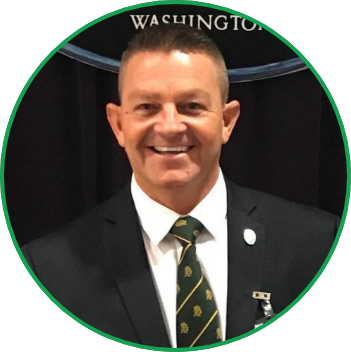Advisory Board
Mission Statement
Diversified Rehabilitation Group (Diversified) believes that through integrative professional care, individuals can overcome psychological and physical limitations to achieve a healthy and well-balanced lifestyle. Furthermore, we seek to understand and recognize the daily challenges of first responders, veterans, and their family members.
Philosophy
Diversified also acknowledges that there is always an opportunity for growth and innovation. Thus, Diversified established an Advisory Board to further understand its clients’ daily challenges and develop innovative and long-lasting solutions.
Advisory Board
The Advisory Board plays a crucial role in enhancing mental health programs and support offered by Diversified Rehabilitation Group (Diversified) to first responders, veterans, and their family members. By providing guidance, connecting to experts and research, and offering strategic input to the Diversified Leadership Team, the advisory board contributes significantly to the organization’s efforts.
One of the primary functions of the advisory board is to provide guidance to Diversified regarding mental health programs and support services. Members of the board, often experts in the field, share their knowledge and experience to help shape and improve the programs offered by Diversified. This ensures that the organization remains up-to-date with the latest developments and best practices in mental health care for first responders, veterans, and their families.
Additionally, the advisory board serves as a valuable connection to experts and research in the field of mental health. They can facilitate collaborations and partnerships with renowned researchers, academics, and professionals who specialize in occupational stress injuries and other mental health struggles. This access to expertise and research allows Diversified to continuously improve its programs and ensure that they are evidence-based and effective.
Strategic input from the advisory board is another significant contribution. They can provide insights into emerging trends, challenges, and opportunities in the mental health landscape for first responders, veterans, and their families. This input helps Diversified in making informed decisions, setting strategic goals, and aligning their efforts with the evolving needs of the community they serve.
Furthermore, through its network and key contacts, the advisory board helps spread awareness about Diversified’s services among first responders, veterans, and their families. By leveraging their connections, the advisory board members reach out to these individuals and let them know that they are not alone in their struggles. They can communicate that groups like Diversified are available to provide support, increase resiliency, and help overcome psychological challenges associated with occupational stress injuries and other mental health issues.


Our Values
Consistently being ethical, honest, and transparent.

Trust
Being accountable to each other, our clients, partners, and the community.

Respect
Ensuring a supportive, collaborative, and courteous service environment.

Quality
Being committed to client-centered services, ongoing innovation, and best practices.
Board Members

Deputy Chief Lucie Tremblay
Deputy Chief Lucie Tremblay (Retired) has over 35 years of public safety experience at the federal government. Upon joining the VIA Rail Canada Police Service in 2016, she was entrusted with managing police operations and administration. She also supported the corporate security strategy, contributing to the safety and security of passengers, employees, infrastructure, and rail operations.
A police executive veteran of the Canadian Armed Forces, she held numerous positions and command appointments as a Military Police Officer over 28 years of service with the Canadian Forces National Investigation Service, the Canadian Forces National Counter-Intelligence Unit and other groups. She deployed to Afghanistan to command the multinational brigade investigation team and was seconded to Criminal Intelligence Service Canada, contributing to the fight against organized crime. During her military career, she also had the privilege to work in police human resources, selection and training, and policy development. One of her career highlights was to lead the Military Police contribution to a large-scale domestic operation in support of the Vancouver 2010 Olympic Games.
A people-oriented leader focused on wellness and mental health, she contributed to advance the objectives of the Canadian Association of Chiefs of Police (CACP) in various capacities over the past 20 years. As a member and most recently Co-Chair of the CACP Human Resource and Learning committee, she led various wellness and psychological services initiatives. Since 2020, she is a member of the Canadian Institute for Public Safety Research and Treatment (CIPSRT) and the Public Safety Steering Committee (PSSC) which is a standing committee whose members represent federal, provincial, territorial, and municipal public safety organizations. The primary function of the PSSC is to engage in collaboration with CIPSRT, Public Safety Canada (PSC), and the Canadian Institutes of Health Research (CIHR) on matters related to the mental health and well-being of current and former Canadian Public Safety Personnel (PSP), their leaders, and their families.
Lucie is an MBA graduate from Athabasca University executive program, holds a bachelor’s degree in administration from College Militaire de St-Jean and also completed a certificate in Environmental Sciences.

Steve Farina
Steve is a VP for the BC Professional Firefighters Association and is the vice-chair of the BCPFFA’s Mental Health Taskforce, as well as their Occupational Health & Safety Committee. He has over 30 years of experience in the fire service and was hired as a full-time firefighter in Coquitlam in 1997. Read More
Norman E. Taylor
Norm Taylor has been an independent advisor, educator, author and researcher for 40 years, concentrating his practice in the field of policing and public safety for the past 30 years. Between 2008-17, he spent much of his professional life in Saskatchewan as a Senior Advisor to the Deputy Ministry of Justice: Corrections and Policing. Read More
Commander Grant Edwards
Commander Grant Edwards (Ret) was a senior officer of the Australian Federal Police (AFP), with over 34 years of experience in law enforcement and security in protecting vulnerable people around the world. During his tenure with the AFP, he led several high-profile investigations and operations, in transnational organised crime, cybercrime, human trafficking and the exploitation of women and children. Read More
Alan Treddenick
Alan is the CEO of ATNOH Group, a Global Public Safety and Risk Consultancy. Prior to founding the company, Alan spent 32 years with the Canadian Security Intelligence Service (CSIS) and the Royal Canadian Mounted Police (RCMP), involved in extensive counter-terrorism operations within Canada and abroad. Read More
Phil Lancaster
Phil Lancaster’s extensive career in law enforcement combined with a passion for excellence and an aptitude for recognizing opportunity ultimately led to a successful career in business. As a former British police officer, Phil brings years of experience working internationally in VIP close protection, as well as service in British Overseas Territories. Throughout his career, Phil received several notable awards and has been recognized for his efforts in the UK and overseas. Read More
Amanda Newman Bio
Amanda Newman is a Supervisor with the RCMP Operational Communications Centre in Manitoba. Amanda has over 25 combined years of customer service experience in local government, food & beverage service as well as administrative service, including Human Resources, supervisory and management positions.
Amanda is passionate about workplace mental health and wellbeing and has developed a keen interest in helping and supporting others in their journey with PTSD, moral Injury & resiliency. Amanda has had her own lived experience with PTSD and moral Injury and through her journey with the program she was able to work through her triggers and struggles.
When Amanda is not working you can usually find her spending time with her family and two fur babies, cooking/baking, running or spending time with friends.
Amanda also has developed a renewed love for social engagements as well respecting her own downtime which usually includes some art project of sorts or spending time in nature.

Jadie Miller Bio
Jadie has almost two decades of experience as an active firefighter, serving in the past as a volunteer and now within a full-time career in Ontario Canada. She is the co-author of the proposed framework called ‘Firefighter Syndrome’ and CEO/Founder of PYROC Technologies Inc. Jadie is a subject matter expert that builds frameworks designed to detect risks and deficiencies within critical infrastructures.
The objectives within her frameworks are to empower Individuals to identify, mitigate and navigate the interdependencies and disruptions unique to each environment. Her specialty focuses on working within dynamic operational environments that require unified standards, however operate under independent strategic and tactical objectives.
She values and prioritizes the challenges that both Fire Chiefs and Firefighters face independently and collectively.

Joseph E. Troiani, MHA, MA, MSSI, Ph.D., CADC
Founding Director of Military Psychology at Adler University
Dr. Troiani is the Founding Director of Military Psychology Program @ Adler University and Associate Professor of Clinical Psychology at the Adler University he has taught since 1993. He is the founder and developer of both the Military Clinical Psychology Track, which is part of the Doctoral Program in Clinical Psychology and the M.A. Online in Military Psychology. At the school he instructs courses in both the M.A. in Military Psychology program and in the Psy.D.’s Military Clinical Psychology track. At Adler University he is faculty advisor to the school’s Military Psychology Student Association.
His clinical experience has included working at the Veterans Administration Hospital with returning Vietnam veterans and military service members, which he brings to the classroom when instructing graduate students about working with those who are serving, have served, and their families. Currently, he lectures on the subject of “Mental Health and Substance Abuse Issues with returning Iraq and Afghan War Veterans” to the professional behavioral health community.
Education:
Dr. Troiani has a Ph.D. and M.A. in Clinical Psychology from the Fielding Graduate University, a M.A. in Health Services Administration from Governors State University, a B.A. from Northeastern Illinois University and is a Graduate of the Two-Year Program at the Alcoholism Training Institute. He also completed a Post-Graduate Fellowship from the Illinois Public Health Leadership Institute located in the School of Public Health at the University of Illinois at Chicago. From the military he earned a Master’s of Science in Strategic Intelligence (M.S.S.I.) from The National Defense Intelligence College (now National Intelligence University). He also has a Diploma from the Naval War College, College of Naval Command and Staff.
Professional Career:
Dr. Troiani started his professional career at Grant Hospital of Chicago working on their inpatient psychiatric unit. It was there that he was introduced to Adlerian Psychology and the Adler Institute. While at Grant Hospital he completed their two year clinical training program at the Alcoholism Training Institute at Grant Hospital. After completing the training he was hired by the West Side Veterans Hospital (now named Jessie Brown V.A. Hospital) where he worked as a substance abuse counselor in the Department of Psychiatry. After leaving the V.A. he went to work as a mental health therapist with the Out Patient Mental Health Clinic located at Loretto Hospital. At Forest Hospital he was the Coordinator of Substance Rehabilitation Services later returning to Loretto Hospital as the Director of the Addiction Program and Education Center (APEC) where he remained for 13 years. Hired as a Hospital Administrator by CompCare Inc. he managed the operation of a 120 bed specialty hospital treating both adults and adolescents with substance abuse disorders. Operating the same facility purchased by Parkside Medical of Lutheran General Hospital he continued on as their Executive Director. He was hired as the Hospital Administrator of a new start-up psychiatric hospital named University Hospital. From University Hospital he was the Chief Executive Officer with CPC Old Orchard Hospital. Returning to his community mental health roots in 1993 he became the Director of Mental Health and Addictions Programs (now named Behavioral Health Programs) for the Will County Health Department. Today the Division of Behavioral Health Programs consists of a full range of comprehensive clinical programs including: Crisis Response System for Adults and Children, both an Adult and Child & Adolescent Outpatient Program, Outpatient Psychiatry, Correctional Mental Health, Forensic Mental Health, Homeless Program, and a Substance Abuse Treatment Program. The division is also engaged with the Will County Mental Health, Drug, and Veterans Courts. Established in 1996 the Clinical Training Program provides practicums, externships, and pre-doctoral clinical psychology internships, which are currently APPIC approved. Recently the division was awarded a grant by the American Psychological Association (APA) to assist in obtaining APA approval for the Clinical Training Program.
Professional Recognition/Awards:
- 2019 Counselor of the Year Illinois Certification Board
- 2017 Distinguished Illinois Psychologist Award (IPA)
- Karl F. Heiser Presidential Award for Advocacy, American Psychological Association (APA), 2015
- Military Hero Award, American Red Cross of Chicago & Northern Illinois in 2015
- Mental Health America of Illinois (MHAI-IL) Program Innovation Award in 2013


Updates from Advisory Board

Media, Press

Research



